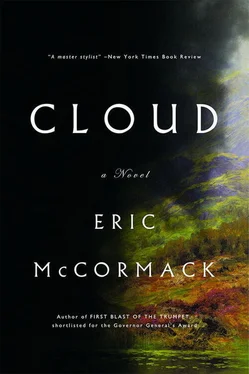“Look more closely over there,” said Frank, drawing my attention to a particular area of the painting.
So I did look carefully. Holding the magnifying glass at a different angle, I could make out different species of birds in a variety of different types of trees. Farther up the riverbank were cottages with smocked peasants working in gardens. In one of the cottages, I could even see a figure looking out of a casement window down towards the distant rider, as though in expectation of his coming.
“But look at the boat,” Frank said.
I hadn’t seen any boat. But once again, adjusting the magnifying glass, I discovered that what had seemed like a tiny mark far up the river was actually a rowboat with three men in it, their features and clothing quite distinct. Two were concentrated on the work of rowing, straining against the current.
“Look at the other man,” Frank said. “See what he has in his hand?”
I fiddled with the magnifying glass a little more. This third man did indeed seem to have something in his fingers which he was staring at. I manoeuvred the glass again and the object in his hand wavered into focus for a moment. There was no doubt. The object in the man’s hand was a book.
“Do you think it’s this book he’s reading?” Frank said.
I was quite startled that Frank should have even thought of such a thing, for it was a dizzying idea to me. For the first time I think I understood something of the spell these miniatures might cast with their suggestion of microscopic worlds within worlds, and we ourselves as giants looking down on them, observing. Or even that our own world might be nothing more than a tiny speck in an infinite universe being observed by infinitely larger giants.
Of course, I certainly didn’t mention that last thought to Frank. I worried that such ideas might drive the fragile mind of a young boy to madness. Yet, young as he was, I never knew quite what to make of him. He often seemed to me to be made of tougher stuff than his father.
For the next six years, as Frank was proceeding through high school, I regularly brought home miniature books for him. Some of them were reputed to be classics of the genre: Portraits of the Town of Madrid , 1741, Le Petit Poucet , 1800, Customs of the Hindu Kush , 1834, and The English Bijou Calendar Poetically Illustrated , 1841. They were all famous for their brilliant illustrations.
I also found a miniature bookcase built with little shelves that would accommodate Frank’s collection. He fell in love with the bookcase, too.
TO MARK HIS eighteenth birthday as well as his acceptance into university, I searched for a special miniature book for him. While I was on business at a mine near Erzurum, in Eastern Turkey, I borrowed a car and drove to the ancient village of Gez, where I’d heard there was a fine bookstore. I found it halfway along the village’s axle-threatening, cobblestoned main street.
The store was full of leather-bound books of all shapes and sizes and ages, as well as glass cases displaying dozens of beautiful old quill pens and inkwells. But even after looking around for almost an hour, I could see no miniature books.
I then spoke to the owner, a sophisticated Istanbul Turk who spoke English. He told me that, as a matter of fact, he did have a miniature — only one. It wasn’t on display because it was too expensive to leave out. He took me to his office, opened a squat safe, and lifted out a cardboard box. He took the lid off the box and gave me a little book to examine.
It was about two inches tall and one and a half inches wide, with a leather cover and a silver latch that seemed smooth with use. The owner said it was a fourteenth-century Turkish edition of the erotic classic, the Kama Sutra . I undid the latch and skimmed through it. The book contained sixty-four tiny, full-colour illustrations of the famous intimate positions — at least, I presumed that’s what they were; they were too small to see.
The owner offered to find me a magnifying glass to convince me of their lifelikeness, but I told him that wouldn’t be necessary. I’d already decided this might be the perfect eighteenth-birthday gift for Frank and was soon engaged in the customary haggling over price. In the end, I paid more than I wanted but left the store with the book in my pocket.
WHEN I ARRIVED back in Camberloo from Turkey, Frank wasn’t home. He was apartment hunting in Toronto, where he’d be attending university. I was glad of his absence, for I wasn’t so sure any longer about giving him the little book. I’d had a good look at the illustrations now through the magnifying glass, and I wondered if it was a proper kind of gift from a father to a son, even though the book was a classic.
I told Alicia about my doubts and she said she’d have to have a look at it. She began examining the illustrations through the glass and was soon laughing out loud, something she rarely did.
“Good gracious! Would you look at that!” she said over and over. In the end, she’d no doubt. “Of course you must give it to him. What a great gift for anyone his age. What fun!”
So when Frank came back from Toronto, I did give it to him and he seemed delighted with it. But we never talked about its subject matter — I wouldn’t have known what to say. Nor did he point out to me any interesting features of the illustrations, as he usually did. But I did see him and Alicia looking through them together and laughing.
That September, he went off to Toronto for his first semester. He left the other miniatures at home, but he took his Kama Sutra with him.
Alicia really missed him and I did, too, but not as much as she did — though, of course, I didn’t tell her that. The fact was, since he’d grown up, he’d become more and more a mystery to me. Unlike my relationship with my own father, which had been based on an unquestioning warmth and love, there was a certain distance between me and Frank. I feared he could see right into me and found some characteristic he couldn’t tolerate. I was so aware of that, it was impossible for me to be spontaneously loving towards him, as a father would like to be with his son. Even in our conversations, I was never quite sure what he wanted from me. Perhaps he needed me to be something I wasn’t capable of being. Accordingly, he withheld himself from me in return.
AS FOR THE KAMA SUTRA , Alicia’s response to the book was typical of her attitude to all things sexual. She regarded them in the same common-sense way she’d always done. I knew she felt bad about our own lack of activity in that area since the birth of Frank.
Every so often, she’d ask sympathetically if I was “doing all right,” and I’d reassure her.
In spite of her natural bent for truth in most things, she didn’t mind deceiving others when it came to the public image of our marriage. Whenever, for example, we had dinner guests— an infrequent occurrence — we’d behave like the ideal couple. Indeed, we both took a certain pleasure in giving convincing performances, as perhaps many other couples do.
Mainly these dinner guests were men — mine representatives who were in Camberloo for a day or two to inspect machinery at the factory — and I could see they envied me. If they happened to have their wives with them, Alicia would put on an even better show.
THE MATTER OF Lew Jonson was similar, in a way. His wife had died years before I’d arrived in Camberloo. They’d been childless and Lew had come to regard Alicia almost as a daughter. When I was away from home on business, he’d worry she might be lonely and would phone her. Often this would end up in her inviting him to dinner.
Alicia told me about the curious rituals that took place at these dinners with Jonson. He was an opera lover and, since she was on the symphony board, he naturally thought it would be a treat for both of them to listen to some of his records after dinner. He’d no idea how much she dreaded that. Like her father, she really wasn’t all that fond of music.
Читать дальше











